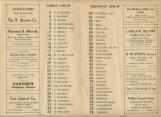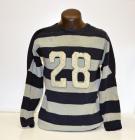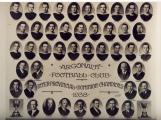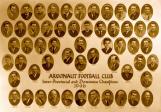2
The Toronto Argonauts football club was formed on October 4, 1873, making them one of the oldest existing clubs in professional North American sport. The Argonauts football club branched off from the Argonauts Rowing Club that was formed in 1871. The purpose of the football club at that time was to keep rowing club in shape during the off-season. After six years of football, the hits players were taking during the football season began to affect their performance in the rowing season, and the Argonauts football club decided to cease operations for the year. In 1880, the Argonauts returned after a change in the rules of rugby-football. One rule that was changed was the formation rule in which the players would line up side by side instead of being bunched up like a scrum in rugby today. In 1883, with the creation of the Ontario Rugby Football Union (ORFU), the Argonauts became the first ever ORFU champions, defeating the Ottawa Rough Riders (they were known as Ottawa City then) 9-7. The following season in 1884, the Argonauts Football Club defended their ORFU championship, but lost badly to the Quebec Rugby Football Union (QRFU) champions, the Montreal Football Club 30-0. Montreal claimed the Dominion Cup that season and become Canadian champions. From the 1885 to 1889 seasons, the Argonauts did not win any ORFU championships. In fact, they made it back to the ORFU finals just once, in 1889, when they lost to Ottawa College 17-2. In the 1890s, the Argonauts football club did not fare well, so in 1895 it was decided that the Football Club would once again shut down, this time because of disputes between the Argonauts Football club, the Argonauts Rowing Club, and the ORFU. After a three year hiatus the Argonauts football club returned to the ORFU, giving up 140 total points in the six games they played.Hoping to change their luck, the Football Club hired their fourteenth head coach in club history, Pud Kent, and changed their name from the Argonauts Football Club to The Argonauts Rugby Football Club. After making the playoffs in 1900 and 1902, though losing to Ottawa College and the Rough Riders, respectively, the Argonauts finally captured a title. While it was not an ORFU championship, they did capture a city championship defeating the Toronto Torontos 40-1. In 1906, the Argonauts left the ORFU and decided to join the new Inter-Provincial Rugby Football Union (the predecessor to the CFL East division) before the 1907 season. Their first four seasons in the union did not go especially well, but their best season came in 1910 when they finished 3-3 and tied for second place with the Ottawa Rough Riders. In 1911, the Argonauts moved from Rosedale Field to Varsity Stadium, and saw an immediate impact, as they finished their first season in Varsity Stadium in first place, and went on to their first Grey Cup game where they lost to the University of Toronto (U of T) 14-7. The Argonauts returned to the Grey Cup in 1912, but, like the previous year, they lost, this time to the Hamilton Alerts 11-4.
3
During the 1914 season, the Argonauts finally captured their first Grey Cup title, defeating U of T 14-2. The outbreak of World War I affected Argonauts Football and the IRFU, with players being sent overseas to fight. In 1916 it was decided that no games would be played until the war ended. In 1919, the war was over and the IRFU resumed operations, and the Argonauts finished with a 3-3 record.5
In 1920, the Argonauts went to the Grey Cup game, despite some controversy in the semi-final game against the Toronto Rowing Club- a disputed call meant that the game had to be replayed from the second half. Despite this controversy, the Argonauts won the match, and went on to the Grey Cup, once again coming up short as they lost to U of T 16-3. The next season in 1921, the Argonauts returned to the Grey Cup, and with the power of Lionel 'Big Train' Conacher, shut out The Edmonton Eskimos 23-0 in the first ever Grey Cup played between Eastern and Western Canadian teams.6
Lineup of the first ever East-West Grey Cup game between Toronto and Edmonton.3 December 1921
Varsity Stadium, Toronto, Ontario, Canada

8
For the rest of the 1920s, the Argonauts did not make it to the Grey Cup, in fact their best season was in 1922, when they finished 5-0-1, but ended up losing to Queen's University in the semi-final.During the 1923 season, the Argonauts decided to play an exhibition game against the Maryland Third Army Corps in Yankee Stadium, with one half being played under Canadian Rules and the other half being played under American rules. Led by Argonauts captain Cap Fear, Toronto did not stand a chance as they fell to defeat to the American squad 55-7. The Argonauts only score came in the second quarter, while the Army Corps scored on their first three tries.
9
Game Program for the Argonauts vs. Third Corps Area, U.S. Army.3 November 1923
Yankee Stadium, New York City, New York, United States of America

10
The 1930s were good for the club as a whole, as they won three Grey Cups in this decade. In 1933 the Argonauts won their third Grey Cup against the Sarnia Imperials 4-3. The next two seasons of importance for the Argonauts was during the 1937 and 1938 seasons, as they won back-to-back Grey Cups, defeating the Winnipeg Blue Bombers 4-3 and 30-7, respectively. These Argonauts teams were the first since the Ottawa Senators to win the Grey Cup back-to-back.11
Lineup for the Grey Cup between Toronto and Sarnia.9 December 1933
Athletic Park, Sarnia, Ontario, Canada





